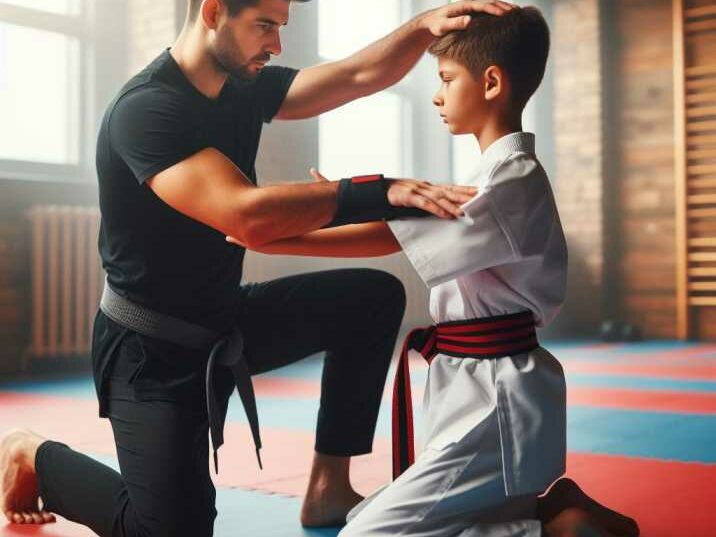Introduction:
Table of Contents
Kung Fu, an ancient Chinese martial art, is known for its grace, power, and discipline. But can it be made accessible for individuals with sensory processing issues? Let’s delve into this topic and explore Kung Fu for sensory processing issues.
Understanding Sensory Processing Issues:
Before we discuss adapting Kung Fu, it’s essential to understand what sensory processing issues entail. Individuals with sensory processing issues may experience challenges in processing and responding to sensory stimuli. This can include sensitivity to light, sound, touch, and movement, among other things.

Adapting Kung Fu for Sensory Processing Issues:
- Simplified Techniques: One way to make Kung Fu more accessible is by simplifying complex techniques. By breaking down movements into smaller, more manageable steps, individuals with sensory processing issues can better grasp and execute them.
- Customized Instruction: Tailoring instruction to accommodate different sensory needs is crucial. For example, providing visual demonstrations, verbal instructions, and hands-on guidance can help individuals with sensory processing issues learn and progress in Kung Fu.
- Structured Environment: Creating a structured and predictable environment can also benefit individuals with sensory processing issues. Clear routines, consistent expectations, and minimal sensory distractions can enhance their learning experience and comfort level.
- Sensory Integration: Incorporating sensory integration activities into Kung Fu training can be beneficial. This includes activities that help individuals regulate their sensory experiences, such as deep breathing exercises, proprioceptive input, and tactile stimulation.
Benefits of Kung Fu for Sensory Processing Issues:
- Improved Focus and Concentration: Kung Fu training promotes focus, concentration, and mindfulness, which can benefit individuals with sensory processing issues.
- Enhanced Motor Skills: Practicing Kung Fu can help improve coordination, balance, and gross motor skills in individuals with sensory processing issues.
- Boosted Confidence: Mastering Kung Fu techniques can instill a sense of accomplishment and confidence in individuals with sensory processing issues.

Table of Information Kung Fu for Sensory Processing Issues:
| Adaptations of Kung Fu for Sensory Processing Issues | Benefits of Kung Fu Training |
|---|---|
| Simplified techniques | Improved focus and concentration |
| Customized instruction | Enhanced motor skills |
| Structured environment | Boosted confidence |
| Sensory integration |
Conclusion:
In conclusion,Kung Fu for sensory processing issues. While Kung Fu may present challenges for individuals with sensory processing issues, it can certainly be adapted to meet their needs. By simplifying techniques, providing customized instruction, creating a structured environment, and incorporating sensory integration activities, Kung Fu can become an inclusive and beneficial practice for individuals of all abilities.
FAQs:
- Can individuals with sensory processing issues participate in group Kung Fu classes? Yes, with the right accommodations and support, individuals with sensory processing issues can participate in group Kung Fu classes.
- Are there specific Kung Fu styles better suited for individuals with sensory processing issues? While any style of Kung Fu can be adapted, styles that emphasize fluidity and gentle movements may be more suitable for individuals with sensory processing issues.
- How can instructors support students with sensory processing issues during Kung Fu training? Instructors can support students by providing clear instructions, offering individualized guidance, and creating a sensory-friendly learning environment.
- What are some sensory integration activities that can be incorporated into Kung Fu training? Sensory integration activities may include deep breathing exercises, joint compressions, and using tactile objects during training.
- Can Kung Fu training help individuals with sensory processing issues improve their self-regulation skills? Yes, Kung Fu training can help individuals develop self-regulation skills by promoting mindfulness, body awareness, and emotional control.
- Can Kung Fu training be integrated into occupational therapy for individuals with sensory processing issues? Yes, Kung Fu training can complement occupational therapy by addressing motor skills, sensory integration, and emotional regulation in a dynamic and engaging way.
- Can Kung Fu training help individuals with sensory processing issues improve their social skills? Yes, Kung Fu training often involves group settings, providing opportunities for individuals to interact, cooperate, and build social connections.


